#Arthur Housman
Text
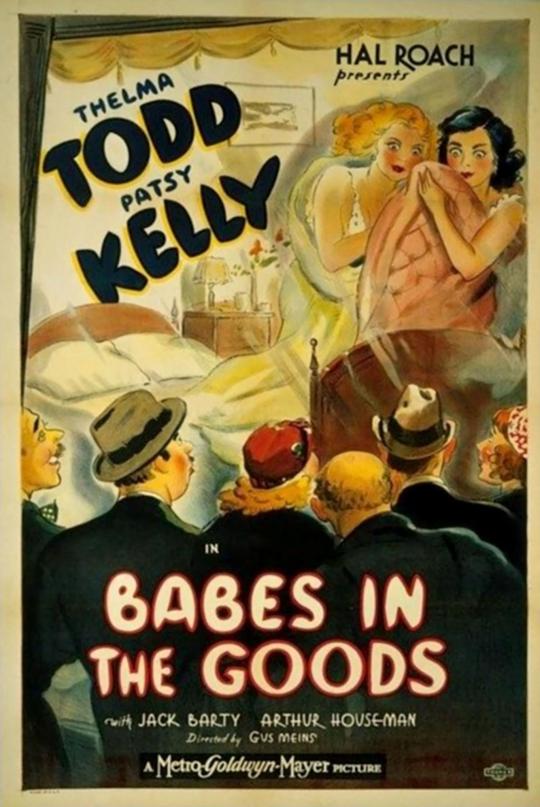
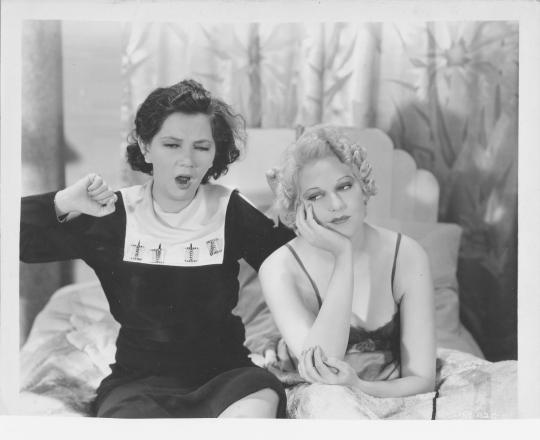
Babes in the Goods (1934) Gus Meins
April 22nd 2024
#babes in the goods#1934#gus meins#thelma todd#patsy kelly#arthur housman#jack barty#hal roach#short#pre-code#PreCodeApril
4 notes
·
View notes
Photo
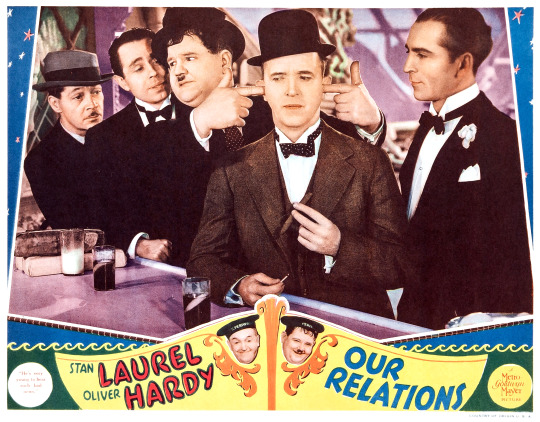
#Stan Laurel#Oliver Hardy#Arthur Housman#Noel Madison#Ralf Harolde#Laurel and Hardy#Our Relations#1936#1930s#features#movies
6 notes
·
View notes
Text
Here are 10 things you should know about Arthur Housman, born 133 years ago today. He played a range of roles over his 30-year career but is best remembered for playing comedic drunks.
#Arthur Housman#silent movies#classic film#classic movies#classic Hollywood#old movies#character actors#Golden Age of Hollywood#vaudeville#precode#precode movies#pre-code#pre-code movies
1 note
·
View note
Text
Books I Cycle Through Every Year
The Chronicles of Narnia
Little Women
The Anne of Green Gables Series
Frankenstein
The Were-Wolf
Dr. Jekyll and Mr. Hyde
The Lord of the Rings & The Hobbit
A Christmas Carol
#One of the first three is always on my person#the last five I re-read only after September starts#middle of Frankenstein now#Mary Shelley#C.S. Lewis#Escapism#J. R. R. Tolkien#Tolkien#l. m. montgomery#Louisa may Alcott#bisclavret#the were-wolf#Clemence Housman#dr. jekyll and mr. hyde#arobert Louis Stevenson#Arthur Conan Doyle
14 notes
·
View notes
Text
to understand me, you'll have to swallow a world

Christopher Moore, Lamb

How Long? from Hadestown

Robin Hobb, The Golden Fool

Doctor Who (2005-), 2x01: New Earth

Kobayashi Issa

How To Get Away With Murder (2014-2020), 2x01: It’s Time To Move On

Wendy Cope, The Orange

Joey Comeau & Emily Horne, A Softer World (#877)

House MD (2004-2012), 2x06: Spin

John Steinbeck, East of Eden

George R. R. Martin, A Storm of Swords

Ally Hills, Wrong
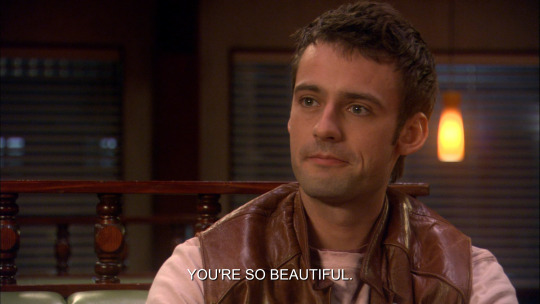
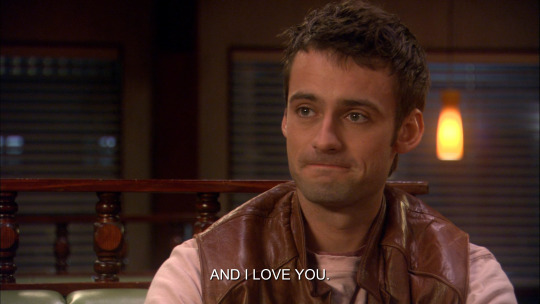

Dead Like Me (2001-2), 2x11: Ashes to Ashes

Oceanbreeze7, Heart Murmurs
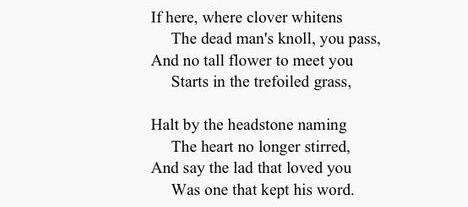
A. E. Housman, Because I Liked You Better

Arthur Miller, All My Sons

Terry Pratchett, Wintersmith

Caitlyn Siehl, Start Here
#webs#web weaving#tag game#mine#christopher moore#hadestown#robin hobb#doctor who#kobayashi issa#how to get away with murder#wendy cope#a softer world#joey comeau#emily horne#house md#john steinbeck#george r. r. martin#ally hills#dead like me#oceanbreeze7#a. e. housman#arthur miller#terry pratchett#caitlyn siehl
655 notes
·
View notes
Text
Vladimir Nabokov’s Brutally Honest Opinions on 63 of the “Greatest” Writers to Ever Write (1973). I got this from a literature FB group; I can’t verify its authenticity. Even if the source is authentic, it seems to me a very subjective exercise, so take it in that spirit.
Auden, W. H. Not familiar with his poetry, but his translations contain deplorable blunders.
Austen, Jane. Great.
Balzac, Honoré de. Mediocre. Fakes realism with easy platitudes.
Barbusse, Henri. Second-rate. A tense-looking but really very loose type of writing.
Beckett, Samuel. Author of lovely novellas and wretched plays.
Bergson, Henri. A favorite between the ages of 20 and 40, and thereafter.
Borges, Jorge Luis. A favorite. How freely one breathes in his marvelous labyrinths! Lucidity of thought, purity of poetry. A man of infinite talent.
Brecht, Bertolt. A nonentity, means absolutely nothing to me.
Brooke, Rupert. A favorite between the ages of 20 and 40, but no longer.
Camus, Albert. Dislike him. Second-rate, ephemeral, puffed-up. A nonentity, means absolutely nothing to me. Awful.
Carroll, Lewis. Have always been fond of him. One would like to have filmed his picnics. The greatest children's story writer of all time.
Cervantes, Miguel de. Don Quixote. A cruel and crude old book.
Cheever, John. “The Country Husband.” A particular favorite. Satisfying coherence.
Chekhov, Anton. A favorite between the ages of 10 and 15, and thereafter. Talent, but not genius. Love him dearly, but cannot rationalize that feeling.
Chesterton, G. K. A favorite between the ages of 8 and 14. Essentially a writer for very young people. Romantic in the large sense.
Conan Doyle, Arthur. A favorite between the ages of 8 and 14, but no longer. Essentially a writer for very young people. Romantic in the large sense.
Conrad, Joseph. A favorite between the ages of 8 and 14. Essentially a writer for very young people. Certainly inferior to Hemingway and Wells. Intolerable souvenir-shop style, romanticist clichés. Nothing I would care to have written myself. In mentality and emotion, hopelessly juvenile. Romantic in the large sense. Slightly bogus.
Dostoevsky, Fyodor. Dislike him. A cheap sensationalist, clumsy and vulgar. A prophet, a claptrap journalist and a slapdash comedian. Some of his scenes are extraordinarily amusing. Nobody takes his reactionary journalism seriously.
Dreiser, Theodore. Dislike him. A formidable mediocrity.
Eliot, T. S. Not quite first-rate.
Emerson, Ralph Waldo. His poetry is delightful.
Faulkner, William. Dislike him. Writer of corncobby chronicles. To consider them masterpieces is an absurd delusion. A nonentity, means absolutely nothing to me.
Flaubert, Gustave. A favorite between the ages of 10 and 15, and thereafter. Read complete works between 14 and 15.
Forster, E. M. Only read one of his novels (possibly A Passage to India?) and disliked it.
Freud, Sigmund. A figure of fun. Loathe him. Vile deceit. Freudian interpretation of dreams is charlatanic, and satanic, nonsense.
García Lorca, Federico. Second-rate, ephemeral, puffed-up.
Gogol, Nikolai. Nobody takes his mystical didacticism seriously. At his worst, as in his Ukrainian stuff, he is a worthless writer; at his best, he is incomparable and inimitable. Loathe his moralistic slant, am depressed and puzzled by his inability to describe young women, deplore his obsession with religion.
Hawthorne, Nathaniel. A splendid writer.
Hemingway, Ernest. A writer of books for boys. Certainly better than Conrad. Has at least a voice of his own. Nothing I would care to have written myself. In mentality and emotion, hopelessly juvenile. Loathe his works about bells, balls, and bulls. The Killers. Delightful, highly artistic. Admirable. The Old Man and the Sea. Wonderful. The description of the iridescent fish and rhythmic urination is superb.
Housman, A. E. A favorite between the ages of 20 and 40, and thereafter.
James, Henry. Dislike him rather intensely, but now and then his wording causes a kind of electric tingle. Certainly not a genius.
Joyce, James. Great. A favorite between the ages of 20 and 40, and thereafter. Let people compare me to Joyce by all means, but my English is patball to Joyce's champion game. A genius.
I. Ulysses. A divine work of art. Greatest masterpiece of 20th century prose. Towers above the rest of Joyce's writing. Noble originality, unique lucidity of thought and style. Molly's monologue is the weakest chapter in the book. Love it for its lucidity and precision.
II. A Portrait of the Artist as a Young Man. Never liked it. A feeble and garrulous book.
III. Finnegans Wake. A formless and dull mass of phony folklore, a cold pudding of a book. Conventional and drab, redeemed from utter insipidity only by infrequent snatches of heavenly intonations. Detest it. A cancerous growth of fancy word-tissue hardly redeems the dreadful joviality of the folklore and the easy, too easy, allegory. Indifferent to it, as to all regional literature written in dialect. A tragic failure and a frightful bore.
Kafka, Franz. The Metamorphosis. Second-greatest masterpiece of 20th century prose.
Kazantzakis, Nikos. Second-rate, ephemeral, puffed-up.
Keats, John. A favorite between the ages of 10 and 15, and thereafter.
Kipling, Rudyard. A favorite between the ages of 8 and 14. Essentially a writer for very young people. Romantic in the large sense.
Lawrence, D. H. Second-rate, ephemeral, puffed-up. Mediocre. Fakes realism with easy platitudes. Execrable.
Lowell, Robert. Not a good translator. A greater offender than Auden.
Mandelshtam, Osip. A wonderful poet, the greatest in Soviet Russia. His poems are admirable specimens of the human mind at its deepest and highest. Not as good as Blok. His tragic fate makes his poetry seem greater than it actually is.
Mann, Thomas. Dislike him. Second-rate, ephemeral, puffed-up.
Maupassant, Guy de. Certainly not a genius.
Maugham, W. Somerset. Mediocre. Fakes realism with easy platitudes. Certainly not a genius.
Melville, Herman. Love him. One would like to have filmed him at breakfast, feeding a sardine to his cat.
Marx, Karl. Loathe him.
Milton, John. A genius.
Pasternak, Boris. An excellent poet, but a poor novelist. Doctor Zhivago. Detest it. Melodramatic and vilely written. To consider it a masterpiece is an absurd delusion. Pro-Bolshevist, historically false. A sorry thing, clumsy, trivial, melodramatic, with stock situations and trite coincidences.
Pirandello, Luigi. Never cared for him.
Plato. Not particularly fond of him.
Poe, Edgar Allan. A favorite between the ages of 10 and 15, but no longer. One would like to have filmed his wedding.
Pound, Ezra. Definitely second-rate. A total fake. A venerable fraud.
Proust, Marcel. A favorite between the ages of 20 and 40, and thereafter. In Search of Lost Time. The first half is the fourth-greatest masterpiece of 20th-century prose.
Pushkin, Alexander. A favorite between the ages of 20 and 40, and thereafter. A genius.
Rimbaud, Arthur. A favorite between the ages of 10 and 15, and thereafter.
Robbe-Grillet, Alain. Great. A favorite. How freely one breathes in his marvelous labyrinths! Lucidity of thought, purity of poetry. Magnificently poetical and original.
Salinger, J. D. By far one of the finest artists in recent years.
Sartre, Jean-Paul. Even more awful than Camus.
Shakespeare, William. Read complete works between 14 and 15. One would like to have filmed him in the role of the King's Ghost. His verbal poetic texture is the greatest the world has ever known, and immensely superior to the structure of his plays as plays. It is the metaphor that is the thing, not the play. A genius.
Sterne, Laurence. Love him.
Tolstoy, Leo. A favorite between the ages of 10 and 15, and thereafter. Read complete works between 14 and 15. Nobody takes his utilitarian moralism seriously. A genius.
I. Anna Karenina. Incomparable prose artistry. The supreme masterpiece of 19th-century literature.
II. The Death of Ivan Ilyich. A close second to Anna Karenina.
III. War and Peace. A little too long. A rollicking historical novel written for the general reader, specifically for the young. Artistically unsatisfying. Cumbersome messages, didactic interludes, artificial coincidences. Uncritical of its historical sources.
Turgenev, Ivan. Talent, but not genius.
Updike, John. By far one of the finest artists in recent years. Like so many of his stories that it is difficult to choose one.
Wells, H. G. A favorite between the ages of 10 and 15, and thereafter. A great artist, my favorite writer when I was a boy. His sociological cogitations can be safely ignored, but his romances and fantasies are superb. A far greater artist than Conrad. A writer for whom I have the deepest admiration.
Wilde, Oscar. Rank moralist and didacticist. A favorite between the ages of 8 and 14. Essentially a writer for very young people. Romantic in the large sense.
Wolfe, Thomas. Second-rate, ephemeral, puffed-up.
https://twitter.com/Essayful/status/1729559047102153008?
6 notes
·
View notes
Text
@jadagul and I were discussing the term “The queen of air and darkness” (originally by Housman) and its use in The Once and Future King. He was surprised I hadn’t read it, and I commented that I think I’d picked up everything via a combination of cultural osmosis and death of the Arthur.
9 notes
·
View notes
Text










I have a debt of my heart's own to thee,
School of my soul! old lime and cloister shade!
Which I, strange suitor, should lament to see
Fully acquitted and exactly paid.
Richard Milnes.
Although a Keele man myself, other universities are available, and this was my first visit to Cambridge, though it didn’t feel like it as I’d heard so much about the place (which turned out to be every bit as good as I’d hoped for.
I had been visiting family St Neots and Bedford- (9) has my parents in the bottom left corner (I don’t know who any of the other people in the background are) and as I watched the punters on the River Cam, I didn’t actually know that flows into the River Great Ouse which flows through St Neots and Bedford, though I later learned this.
I am not a rowing blue and just watched the boats before going to celebrate Trinity Sunday, rather aptly, at Trinity College. (I also went to Kings College but photography is forbidden in there, so Trinity is the only college I photographed).
Trinity was founded in 1546 by Henry VIII who had suppressed ST Neots Priory nine years earlier, but apparently wasn’t all bad, as he did leave us this college, which immediately brought forth graduates to work in the new Protestant bureaucracy such as Francis Bacon, Lord Chancellor, andRobert Devereux, Earl of Essex.
(By Cambridge standards Trinity is an upstart; the university itself was founded in 1204!).
The chapel was built between 1554 annd 1567 at the orders of queens Mary and Elizabeth I and it still worships in the Anglo-Catholic style, which I think is the best form of worship on earth (I found the same at Kings at their famed evensong). The chapel has earned its Grade I listed status!
Therefore, when the civil wars broke out in 1642, Trinity, like most of the university was staunchly royalist; when the parliamentary side won in 1649 and King Charles I was executed, over forty fellows of Trinity lost their livings, including Master Thomas Comber.
Despite the upheaval and the hostility of England’s new rulers, Oliver Cromwell (1649-58) and Richard Cromwell (1658-60), and then the restoration of Charles I’s son Charles II in 1660, Trinity found a new role as the crucible of scientists and mathematicians including Isaac Newton (whose statue you can see in 9; the others are Thomas Babington Macaulay and Alfred Tennyson).
Trinity kept itself at the cutting edge in the 18th and 19th centuries with old boys such as the above named Macaulay and Tennyson, Charles Babbage, and Prime Ministers Charles Grey, William Lamb, Spencer Percival, Arthur Balfour, & Stanley Baldwin studying here at that time.
(Trinity has also given the world six leaders of other countries, a fact that should be borne in mind as the British government-at the time of writing, June 2024, though not for much longer- is trying to restrict overseas students).
The chapel, as you can see, was given a gothic accent in restorations by Arthur Blore 1832 and by Arthur Blomfield in 1868-73. (There were a lot of Arthurs back then). In 1875, Henry Holiday designed the windows which are still here today. In 1911 my favourite poet, AE Housman, became professor in what was to be his home until his death in 1936; Enoch Powell was one of his students.
As well as the above glories of the chapel, there is a sadder remembrance at the War Memorial, which tells of the 607 Trinity men who fell in the First World War and the 384 who fell in the Second World War. Their belief in duty and the responsibility which they bore as gilded youth (about which Housman was to write so hauntingly) was to come to an end here, but is remembered.
Although many students and would-be students died in the war, after six years of conflict, when peace came it brought with it a flood of students; this, and the postwar baby boom, led to a further expansion of Trinity.
(The future King Charles III was one of this postwar expansion; he studied archaeology, anthropology and history from 1967 to 1970, making him the first ever British monarch to hold a university degree. He had, like all Trinuty scholars before him, studied in an all-male environment, but between 1975 and 1978 women undergraduates, postgraduates and fellows took their rightful place here).
Trinity is legendary for its May Ball and the fame won by those who succeed in partying all night and thus make it into the survivors’ photo, but that is something I’m twenty years too late for.
0 notes
Text
youtube
The piece Will sings at the cailey in the manor house during the storm is a setting of "White in the moon the long road lies," from AE Housman's series "A Shropshire Lad." I think it's somewhat likely, given the other entertainments (e.g., the early 20th century novel Miss Greythorne is reading the kids earlier), that Will sings the Arthur Somervell setting. The only recordings I can find are baritones, and we know Will's still a soprano, so maybe imagine this up an octave.
I'm glad that the Walker gets a moment of peace and forgetting while listening to him, even if that peace is colored by "hopeless longing" for what he has lost, and even if it's immediately followed by the Walker summoning winter and horror into the hall.
#hawkin? there is still time to come home#susan cooper#the dark is rising#the dark is reading#readathon#uath is 'horror' in old irish#holda is a goddess of winter#the beings hawkin / the walker summons aren't all from the same pantheon#Youtube
0 notes
Text






Edgar Kennedy (future cop in Our Gang) with Louise Fazenda in Fatty's Tintype Tangle (1915)
Prior to establishing himself as one of Hollywood's most prominent character comedians and master of the "slow burn," with his hand slowly moving down his baldpate and over his exasperated face, Edgar Kennedy was a mainstay in well over 60 Keystone and Sennett comedies between 1913 and 1919. During that era, he still had some hair and a svelte physique, and was referred to as "Big Ed." He returned to Sennett as a director and supporting player in 1924, and made a final freelance appearance in 1932.
Born in Lake San Antonio, near King City in Monterey County, California, Kennedy was a ex-boxer who put his muscular frame to good use as Keystone cops and jealous husbands his Sennett years. Kennedy toured on stage in musical comedies, and made his film debut in Brown in Harvard (1911) with Selig in Chicago. He appears to have been given his start at Keystone through the auspices of Fred Mace, who was arranging boxing matches for Kennedy at the time.
Kennedy left Sennett for L-KO in 1917, then went to Fox Sunshine Comedies in 1918, before returning to Sennett for much of 1919. Edgar also worked in Clyde Cook's Fox Comedies (1921-23), a Lloyd Hamilton comedy (1923) again with Cook in a couple of independent shorts of Educational (1924) and a 1925 Arrow Mirthquake Comedy with Bobby Ray. He also freelanced in features. Kennedy put his boxing skills to use in Universal's "Leather Pushers" series in 1922 as the character of "Ptomaine Tommy," and he also did double duty as a director on Universal's Blue Bird comedies (1926-27).
In 1928, Kennedy joined Hal Roach studios, where he made several memorable appearances in Laurel and Hardy and Our Gang comedies, in addition to co-starring in the classic A Pair of Tights. He made a few Pathé shorts with Arthur Housman, before RKO placed him in his own series of two-reelers in 1931. He would continue to make these "Mr. Average Man" shorts for the next 17 years, until his death. Between shorts, he found himself in high demand as a featured supporting actor. Kennedy had particularly notable showcases for his dramatic ability in the films.
He died of throat cancer at 58 at the Motion Picture Hospital in Woodland Hills, California, leaving widow Patricia Allwyn (whom he married in 1924, after a brief marriage to actress Ruth King), son Larry and daughter Colleen, and is interred at Holy Cross Cemetery, Culver City.
-Walker, B.E., 2010, Mack Sennett's Fun Factory, McFarland&Company, Inc., Publishers, p. 520
0 notes
Text
i can't believe i've picked up 19 king arthur related books in a row (and only dnf'd 4 of them!!) and read whole sections of the Vulgate cycle since late nov and i'm not sick of the topic yet. amazing.
i am nearing the end of my reading challenge though so i have these 4 to go:
The Life of Sir Aglovale de Galis by Clemence Housman (1905)
Blackheart Knights by Laure Eve (2021)
Le crépuscule des elfes by Jean-Louis Fetjaine (1999) (he has a bunch more in his arthurian world but i only need one)
The Doom of Camelot anthology ed. James Lowder (2000)
but lots more that i haven't been able to get around to in time
0 notes
Text
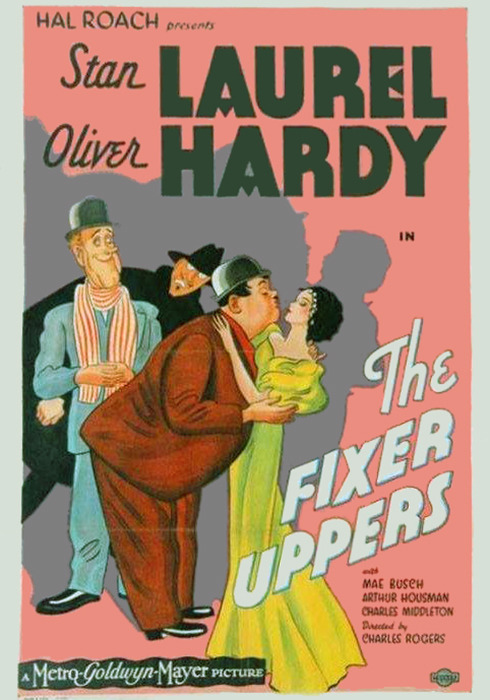
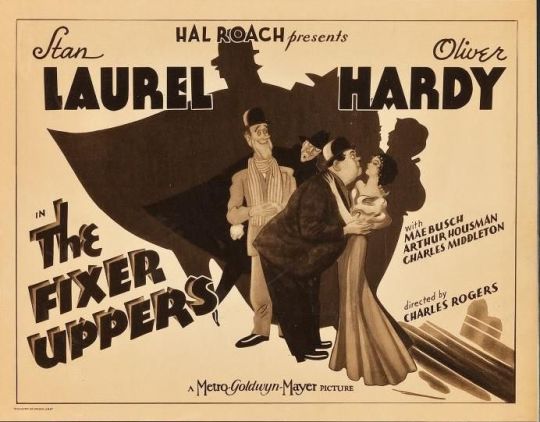
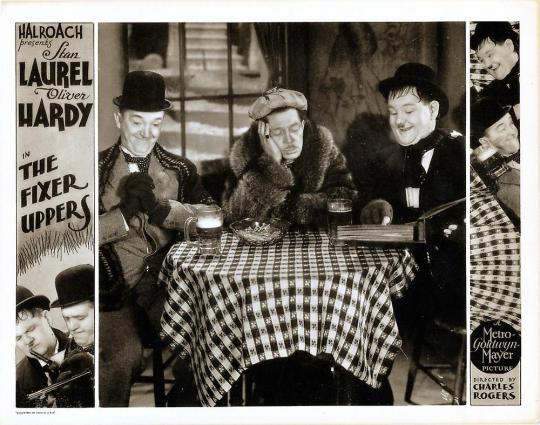

The Fixer Uppers (1935) Charley Rogers
February 11th 2024
#the fixer uppers#1935#charley rogers#stan laurel#oliver hardy#mae busch#charles middleton#arthur housman#hal roach#laurel and hardy#short
2 notes
·
View notes
Text

George O'Brien and Margaret Livingston in Sunrise (F.W. Murnau, 1927)
Cast: George O'Brien, Janet Gaynor, Margaret Livingston, Bodil Rosing, J. Farrell MacDonald, Ralph Sipperly, Jane Winton, Arthur Housman, Eddie Boland. Screenplay: Carl Mayer, based on a story by Hermann Sudermann. Cinematography: Charles Rosher, Carl Struss. Art direction: Rochus Gliese. Film editing: Harold D. Schuster
Sunrise has always seemed to me a triumph of style and technique over substance, which is why I'm not over-eager to join in the chorus hailing it as a masterpiece. Extraordinary, ingenious things are brought to bear on material that seems to me tired and derivative: the town-country divide, the good wife vs. the scheming vixen, the rescues and revelations, the sentimentalizing of the simple folk. All of these were clichés in 1827, let alone 1927. The pretentious subtitle, "A Song of Two Humans," and the labels pasted onto the characters instead of names seem to me laborious attempts to heighten the material into a significance it doesn't really have. That F.W. Murnau, with the considerable help of cast and cinematographers and designers, was able to overcome these flaws and give us something of lasting distinction is undeniable. But a masterpiece would have given us something new, the way, for example, Fritz Lang was able to do the same year in Metropolis, a film that rises above its banalities in visionary ways. There are great moments in Sunrise, but too much of it is horseplay like the pig chase sequence and condescending hokum like the "peasant dance" performed by the Man and the Wife for the amusement of the city slickers. That said, it's possible to be moved by Sunrise without being completely snookered by it.
0 notes
Photo

The Fixer Uppers (1935)
#Stan Laurel#Oliver Hardy#Arthur Housman#Laurel and Hardy#The Fixer Uppers#1935#1930s#sound shorts#movies#Cheers!#🍻#love the scarfs
18 notes
·
View notes
Photo

3 notes
·
View notes
Photo





Arthur Housman played a drunk in hundreds of old movies
12 notes
·
View notes